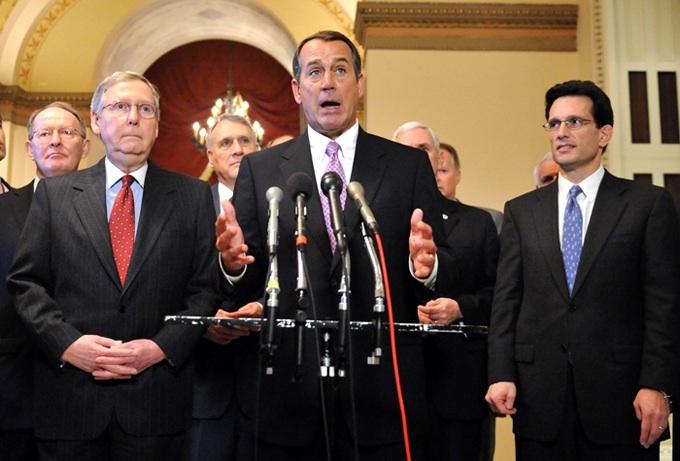Republicans are now openly flirting with the theory that allowing the United States to default briefly on its payment obligations won’t be such a bad thing — and may even be necessary to extract concessions on entitlement spending in exchange for raising the debt limit.
But two of the biggest ratings agencies say they could downgrade the United States’ triple-A credit if the government misses even a single debt-service payment.
“A sovereign’s failure to service its debt as payments come due is a default according to S&P’s sovereign rating criteria,” writes John Piecuch, spokesman for Standard & Poors, one of the “Big Three” credit ratings agencies, in an email to me. “In that case, the rating would be lowered to “SD” (Selective Default).”
A U.S. analyst for Moody’s — another Big Three ratings agency — was not available for an interview. But a spokesman referred me to a February report in which they downplay the likelihood that they’ll have to reduce the country’s credit rating. But it could happen as the result of a major political failure.
“We do not anticipate placing the rating on review for downgrade, even if action to raise the ceiling is delayed for a period of time because the risk of default will likely remain extremely low,” the report reads.
As a general practice, we place ratings under review when the probability of a rating change is substantial, such as 25% or more. Considering the array of cash management tools available to the government and the speed at which political compromises can be reached when necessary, we believe it is extremely unlikely, although not impossible, that this condition will be reached during the political negotiating process. We would place the rating on review if the positions of the political parties evolve to a point where we believe that possible default is no longer a low probability event.
The rating is very unlikely to be downgraded in advance of a ceiling-driven default, since a missed payment would only result, in our opinion, from an astonishing miscalculation by the government. We see an extremely high probability that there will be a political compromise, even if it has a last minute nature, so an anticipatory downgrade would have a very high likelihood of rating reversal.
If debt service were interrupted – however briefly – we would consider downgrading the rating. However, consistent with our practices elsewhere, a payment that is missed for a brief period would not automatically lead to a “penalty downgrade.” Rather, the rating would consider both the recovery prospects and our updated forward-looking credit
view.
The report was issued several weeks before the United States bumped up against its debt limit on Monday. Moody’s expected the issue to be resolved before then. But beyond that point, Moody’s expected — accurately — that the Treasury Department would take extraordinary measures to ensure both that creditors would get paid and that normal government services would continue. That’s where we are now. Secretary Timothy Geithner says that by about August 2, he’ll run out of runway space at which point the government will have to dramatically curb its expenditures, causing major service disruptions, or default on its obligations to bondholders, or both. This is the scenario Republicans are playing footsie with, and if it happens, Moody’s may think twice about the U.S. credit rating.
“A downgrade would only be appropriate if the risk of default had increased going forward, which would be likely if the government failed to implement substantive institutional reforms to prevent a recurrence and/or if the market required a substantial and sustained long-term risk premium embedded in the yield of future Treasury debt issues,” the report reads.
It’s still unclear whether Republicans really want to test their hypothesis. But if they do, they can’t say they weren’t warned.










